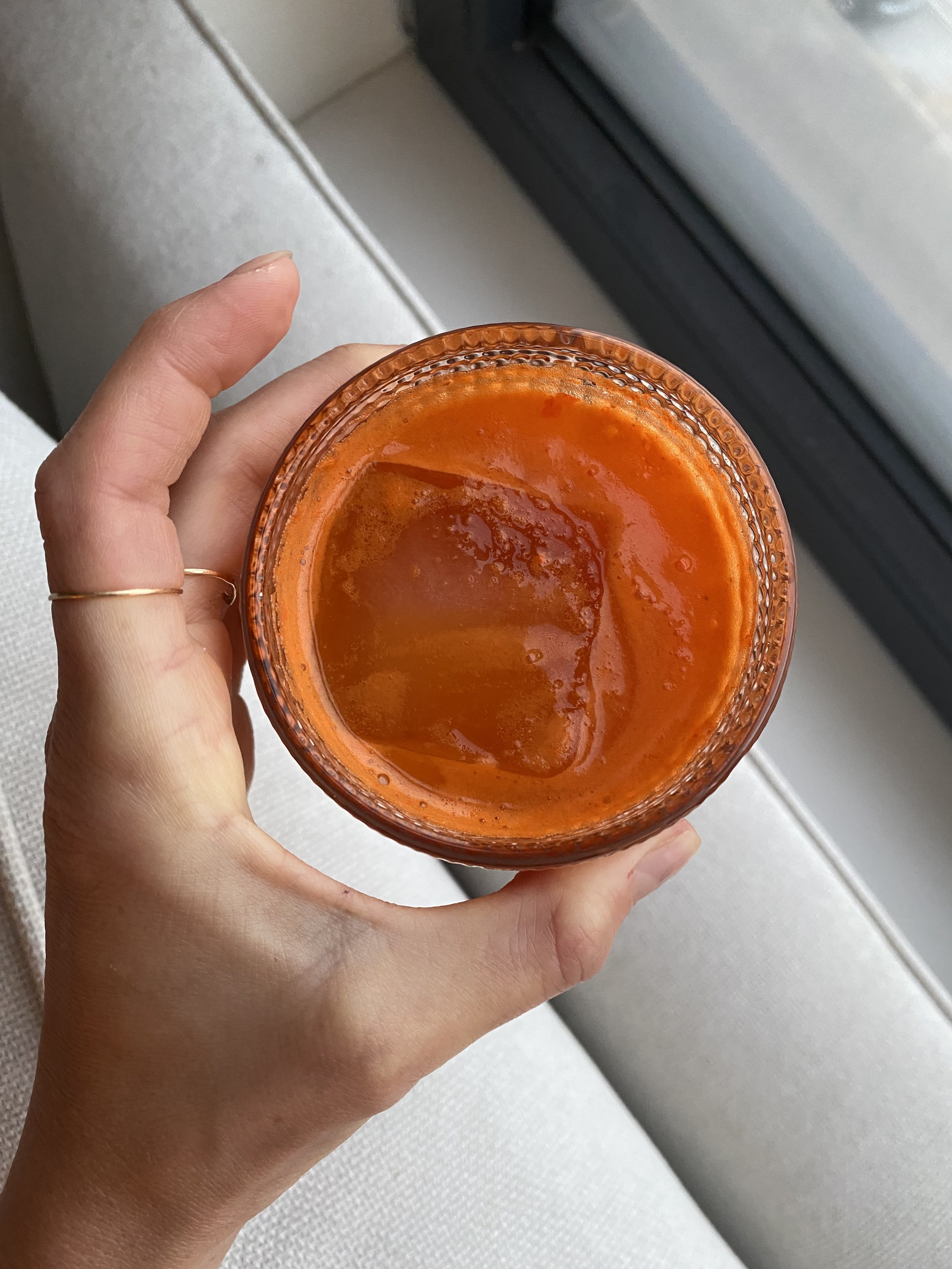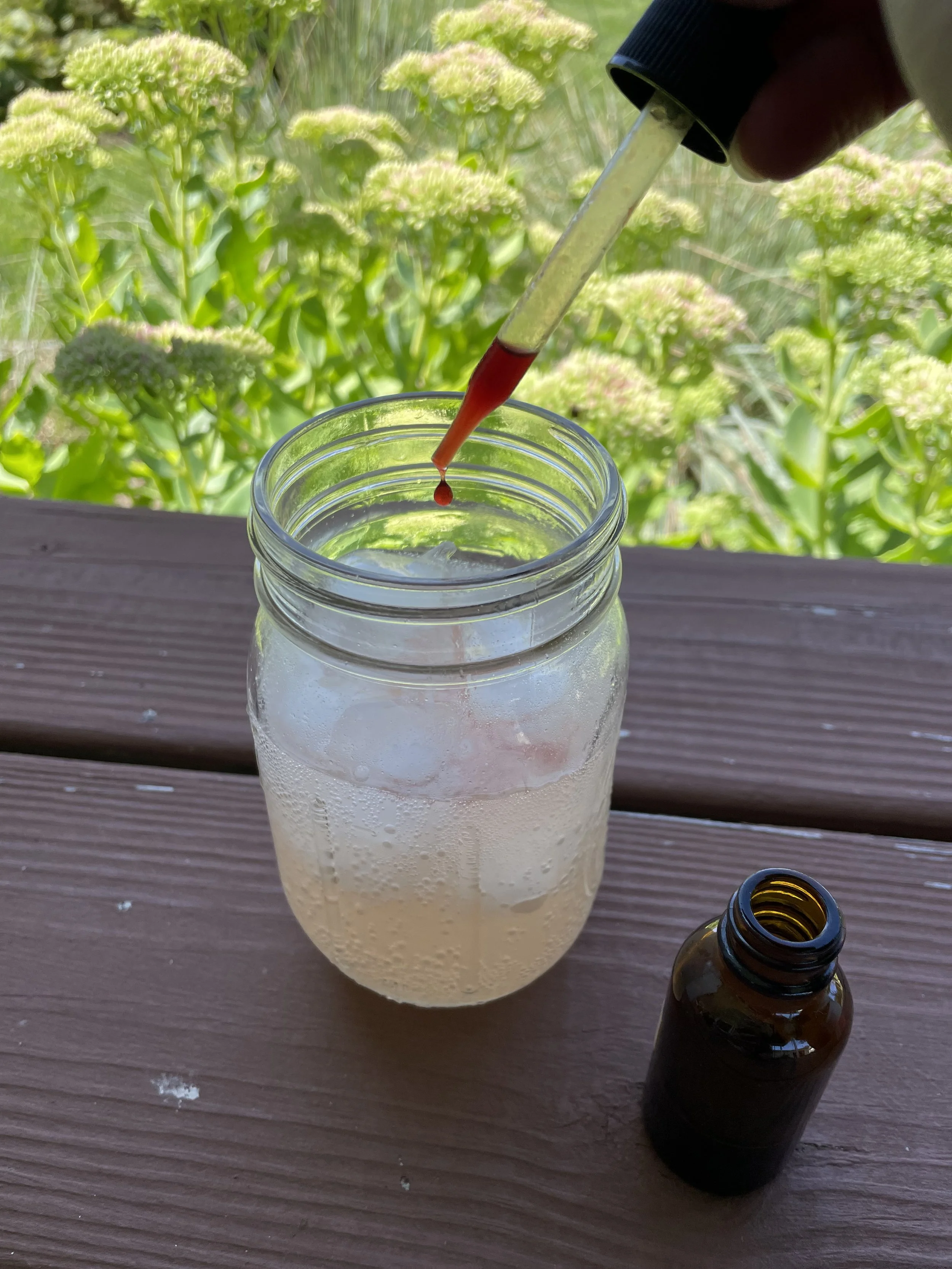The Complete Guide To Bitters: What They Are & How To Use Them
So What are bitters anyways?!
As a Gut Health Dietitian, Bitters Are My #1 Digestive Health Remedy, read on to see why!
What Are Digestive Bitters?!
Bitters are herbal tinctures made from an infusion of bitter plants and herbs.
How Do They Support Health?
In the simplest terms, bitters stimulate the bitter receptors lining the GI tract to trigger a domino effect of enhanced digestion and overall gut health.
Bitters Also Support:
Improved Digestion - Bitter ingestion triggers our bitter receptors lining the GI tract - this process increases output of digestive juices to help us breakdown our food, better absorb nutrients and serves an antimicrobial effect against pathogens - digestive juices include things like saliva, gastrin, stomach acid, insulin, digestive enzymes & pepsin
Acid Reflux - They tonify the LES (lower esophageal sphincter) muscle to prevent reflux - we WANT a toned/tight LES muscle (vs. loose/weak) to help with preventing food from backlogging into the esophagus; studies have shown they also help manage dyspepsia
Daily Poops - Bitter consumption supports the motility of the gut by stimulating the muscular contractions and healthy peristaltic waves that help ‘move things along’ - if you’re prone to constipation, this is your remedy!
Reduced Bloat & Gas - Via enhancing digestive and gastric movement, bitters can buffer the suboptimal digestion and slowed motility that are often a root cause of bloat and uncomfortable gas!
Bitters Origin Fun Fact: The role of bitter taste has historically been identified as a mechanism to signal toxicity and alert animals against consuming harmful compounds.
What we now know is that bitter compounds (like digestive bitters & bitter foods) support the liver and bile flow pathways of the human body that help us excrete toxins, thereby benefitting overall health.
Other Health Bennys of Bitters:
Lowered Blood Sugar - Herbal bitters trigger insulin release and therefore supports healthy blood sugar management; studies specifically show consistency in lowering post-meal blood glucose
Reduced Sugar Cravings - Studies show that bitter flavors inhibit sweet-responsive neurons in the brain therefore reducing the desire for sugar, especially bitters like dandelion root citrus peel and licorice root
Healthy Bile Flow - Studies support that bitter intake triggers CCK (a digestive hormone) release which directly increases bile flow from the gallbladder - this helps us emulsify and digest fats, absorb fat soluble vitamins and helps remove toxins
Liver Detox - Via enhanced bile flow, bitters can support the liver in doing its job by helping with bodily release of toxins and waste products
Can ya tell I’m obsessed with bitters for all the things?!
Hence, why I launched a celiac-safe, organic and gut-health supportive bitters of my own: JÜJ digestive bitters
How To Use Digestive Bitters:
Before Meals - Especially if you’re interested in blood sugar benefits, simply drop 5-7 drops of JÜJ digestive bitters directly onto your tongue (or diluted in a bit of water) right before a meal to enhance digestive processes and optimize nutrient absorption.
Mocktails & Cocktails - I love adding anywhere from 1-3 dropperfuls of JÜJ digestive bitters to a sparkling water, iced tea or my favorite mocktail recipes before and alongside a meal to enhance digestion. Bitters work well in your favorite cocktail recipe as well to ensure you’re giving your body a little extra love and support.
Warm Beverage - I enjoy adding 1 dropperful of our lemon bitters to a cup of warm ginger or green tea -especially when I’m traveling and need a gut motility boost to prevent constipation.
Part of A Morning Ritual - Bitters add a little extra oomph to my day by elevating my bevvie - I enjoy adding a few drops of Cranbiscus JÜJ to my OG mineral mocktail for a boost of electrolytes & digestive support to optimize nutrient absorption first thing in the morning.
Support your body & find joy doing it…try my signature curated bitters brand: JÜJ
Is it mock o’clock?!
Adding drops of my JÜJ bitters to a mocktail or soda water is my favorite way to enjoy them on the daily!
Who shouldn’t take bitters?
Depending on the herbal blend, I recommend exercising caution and talking to your doctor when starting bitters for those who are pregnant, have kidney stones, hiatal hernia or severe GERD. In some cases of gallstones, they are also not recommended. We recommend that you consult with your doctor/practitioner anytime you’re adding in a new supplement or herbal remedy.
References:
Rezaie P, Bitarafan V, Horowitz M, Feinle-Bisset C. Effects of Bitter Substances on GI Function, Energy Intake and Glycaemia-Do Preclinical Findings Translate to Outcomes in Humans? Nutrients. 2021 Apr 16;13(4):1317. doi: 10.3390/nu13041317. PMID: 33923589; PMCID: PMC8072924.
Yoshida R, Shin M, Yasumatsu K, Takai S, Inoue M, Shigemura N, Takiguchi S, Nakamura S, Ninomiya Y. The Role of Cholecystokinin in Peripheral Taste Signaling in Mice. Front Physiol. 2017 Oct 31;8:866. doi: 10.3389/fphys.2017.00866. PMID: 29163209; PMCID: PMC5671461.
Sternini C, Anselmi L, Rozengurt E. Enteroendocrine cells: a site of 'taste' in gastrointestinal chemosensing. Curr Opin Endocrinol Diabetes Obes. 2008 Feb;15(1):73-8. doi: 10.1097/MED.0b013e3282f43a73. PMID: 18185066; PMCID: PMC2943060.
Andreozzi P, Sarnelli G, Pesce M, Zito FP, Alessandro AD, Verlezza V, Palumbo I, Turco F, Esposito K, Cuomo R. The Bitter Taste Receptor Agonist Quinine Reduces Calorie Intake and Increases the Postprandial Release of Cholecystokinin in Healthy Subjects. J Neurogastroenterol Motil. 2015 Oct 1;21(4):511-9. doi: 10.5056/jnm15028. PMID: 26351252; PMCID: PMC4622133.
McMullen MK, Whitehouse JM, Towell A. Bitters: Time for a New Paradigm. Evid Based Complement Alternat Med. 2015;2015:670504. doi: 10.1155/2015/670504. Epub 2015 May 14. PMID: 26074998; PMCID: PMC4446506.





